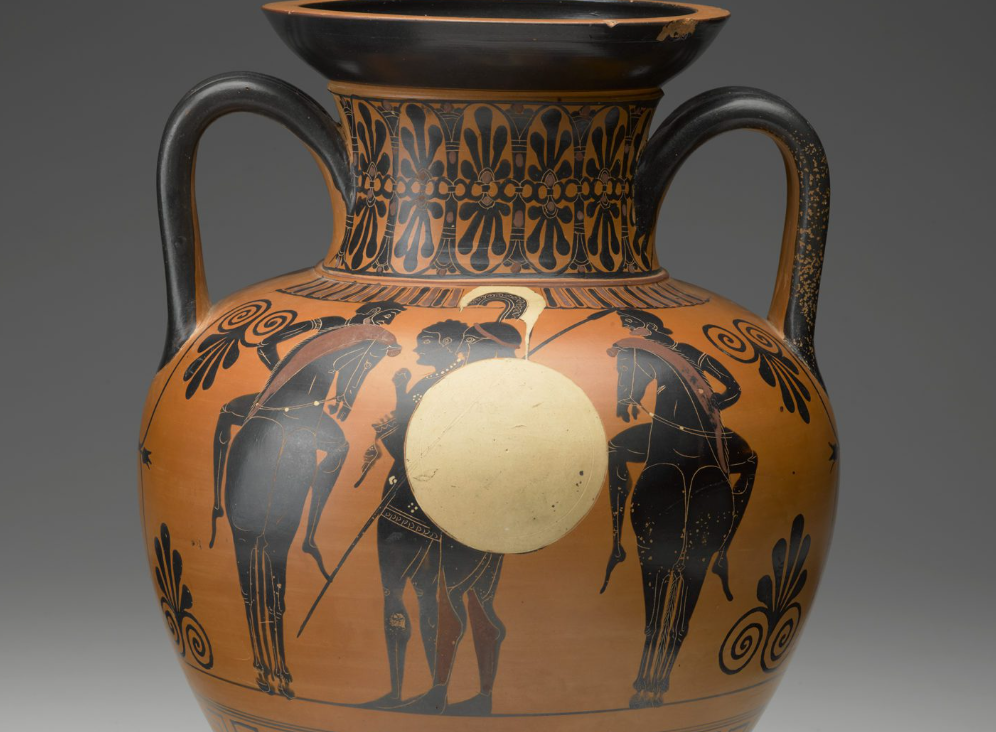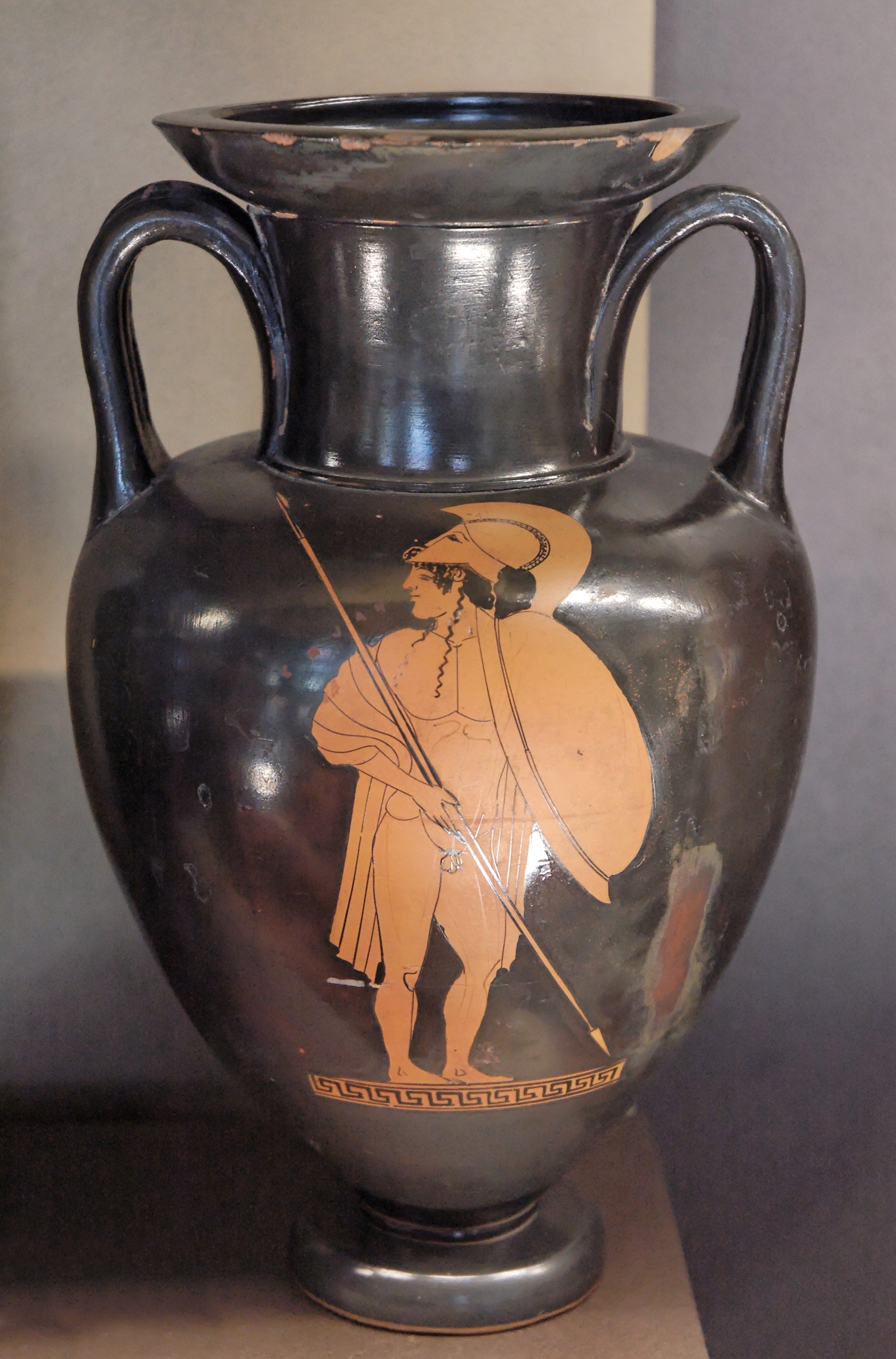|
Memnon
In Greek mythology, Memnon (; Ancient Greek: Μέμνων, ) was a king of Aethiopia and son of Tithonus and Eos. During the Trojan War, he brought an army to Troy's defense and killed Antilochus, Nestor (mythology), Nestor's son, during a fierce battle. Nestor challenged Memnon to a fight, but Memnon refused, being there was little honor in killing the aged man. Nestor then pleaded with Achilles to avenge his son's death. Despite warnings that soon after Memnon fell so too would Achilles, the two men fought. Memnon drew blood from Achilles, but Achilles drove his spear through Memnon's chest, sending the Aethiopian army running. The death of Memnon echoes that of Hector, another defender of Troy whom Achilles also killed out of revenge for a fallen comrade, Patroclus. After Memnon's death, Zeus was moved by Eos' tears and granted him immortality. Memnon's death is related at length in the lost epic ''Aethiopis'', likely composed after ''The Iliad'', circa the 7th century Befo ... [...More Info...] [...Related Items...] OR: [Wikipedia] [Google] [Baidu] |
Posthomerica
The ''Posthomerica'' () is an epic poem in Greek hexameter verse by Quintus of Smyrna. Probably written in the 3rd century AD, it tells the story of the Trojan War, between the death of Hector and the fall of Troy, Ilium (Troy). The poem is an abridgement of the events described in the epic poems ''Aethiopis'' and ''Iliou Persis'' by Arctinus of Miletus, and the ''Little Iliad'' by Lesches, all now-lost poems of the Epic Cycle. The first four books, covering the same ground as the ''Aethiopis'', describe the doughty deeds and deaths of Penthesileia the Amazons, Amazon, of Memnon (mythology), Memnon, son of the Morning, and of Achilles; and the funeral games in honour of Achilles. Books five through twelve, covering the same ground as the ''Little Iliad'', span from the contest between Telamonian Ajax, Ajax and Odysseus for the arms of Achilles, the death of Ajax by suicide after his loss, the exploits of Neoptolemus, Eurypylus (king of Thessaly), Eurypylus and Deiphobus, the death ... [...More Info...] [...Related Items...] OR: [Wikipedia] [Google] [Baidu] |
Achilles
In Greek mythology, Achilles ( ) or Achilleus () was a hero of the Trojan War who was known as being the greatest of all the Greek warriors. The central character in Homer's ''Iliad'', he was the son of the Nereids, Nereid Thetis and Peleus, king of Phthia and famous Argonauts, Argonaut. Achilles was raised in Phthia along with his childhood companion Patroclus and received his education by the centaur Chiron. In the ''Iliad'', he is presented as the commander of the mythical tribe of the Myrmidons. Achilles' most notable feat during the Trojan War was the slaying of the Trojan prince Hector outside the gates of Troy. Although the death of Achilles is not presented in the ''Iliad'', other sources concur that he was killed near the end of the Trojan War by Paris (mythology), Paris, who shot him with an arrow. Later legends (beginning with Statius' unfinished epic ''Achilleid'', written in the first century CE) state that Achilles was invulnerable in all of his body except ... [...More Info...] [...Related Items...] OR: [Wikipedia] [Google] [Baidu] |
Aethiopis
The ''Aithiopis'' (; ), also spelled ''Aethiopis'', is a lost Epic poetry, epic of ancient Greek literature. It was one of the Epic Cycle, which told the entire history of the Trojan War in epic verse. The story of the ''Aethiopis'' lands chronologically after the Homeric ''Iliad'', and could be followed by that of the ''Little Iliad''. The ''Aethiopis'' was often attributed by ancient writers to Arctinus, Arctinus of Miletus who lived in the 8th century BC (see Cyclic poets). The poem comprised five books of verse in dactylic hexameter. Very few fragments of the ''Aethiopis'' survive today; Proclus's summary of the poems' contents establishes the narrative framework of the epic. Date The ''Aethiopis'' was probably composed in the seventh century BC, but there is much uncertainty about its date. Ancient sources date Arctinus to the eighth century; but the earliest artistic representations of one of the most important characters, Penthesilea, date to about 600 BC, suggesting a muc ... [...More Info...] [...Related Items...] OR: [Wikipedia] [Google] [Baidu] |
Tithonus
In Greek mythology, Tithonus ( or ; ) was the lover of Eos, Goddess of the Dawn. He was a prince of Troy, the son of King Laomedon by the Naiad Strymo (). The mythology reflected by the fifth-century vase-painters of Athens envisaged Tithonus as a '' rhapsode'', as attested by the lyre in his hand, on an oinochoe (wine jug) of the Achilles Painter, ''circa'' 470–460 BC. An asteroid (6998) has been named after Tithonus. Etymology Tithonus has been taken by the allegorist to mean ‘a grant of a stretching-out’ (from ''teinō'' and ''ōnė''), a reference to the stretching-out of his life, at Eos’s plea; but it is likely, rather, to have been a masculine form of Eos’s own name, Titonë – from ''titō'', ‘day and onë, ‘queen’ – and to have meant ‘partner of the Queen of Day’. Mythology Eos is said to have taken Tithonus, from the royal house of Troy, to be her lover.''Homeric Hymn to Aphrodite'', 218 ''ff''. The myth of Eos and Tithonus' love was known ... [...More Info...] [...Related Items...] OR: [Wikipedia] [Google] [Baidu] |
Trojan War
The Trojan War was a legendary conflict in Greek mythology that took place around the twelfth or thirteenth century BC. The war was waged by the Achaeans (Homer), Achaeans (Ancient Greece, Greeks) against the city of Troy after Paris (mythology), Paris of Troy took Helen of Troy, Helen from her husband Menelaus, king of Sparta. The war is one of the most important events in Greek mythology, and it has been Epic Cycle, narrated through many works of ancient Greek literature, Greek literature, most notably Homer's ''Iliad''. The core of the ''Iliad'' (Books II – XXIII) describes a period of four days and two nights in the tenth year of the decade-long siege of Troy; the ''Odyssey'' describes the journey home of Odysseus, one of the war's heroes. Other parts of the war are described in a Epic Cycle, cycle of epic poems, which have survived through fragments. Episodes from the war provided material for Greek tragedy and other works of Greek literature, and for Latin literature, ... [...More Info...] [...Related Items...] OR: [Wikipedia] [Google] [Baidu] |
Aethiopia
Ancient Aethiopia, () first appears as a geographical term in classical documents in reference to the skin color of the inhabitants of the upper Nile in northern Sudan, of areas south of the Sahara, and of certain areas in Asia. Its earliest mention is in the works of Homer: twice in the ''Iliad'', and three times in the ''Odyssey''. The Greek historian Herodotus uses the appellation to refer to regions south of Egypt when describing "Aethiopians," indicating Nubia, not the modern nation of Ethiopia. Etymology The Greek name ''Aithiopia'' (, from ) is a compound derived of two Greek words: + . According to the Perseus Project, this designation properly translates in noun form as ''burnt-face'' and in adjectival form as ''red-brown''. As such, it was used as a vague term for darker skinned populations than the Greeks since the time of Homer.“” Homer, ''Iliad'', 1.423, whence nom. “” ''Call.Del.208'': (, ):—properly, ''Burnt-face'', i.e. ''Ethiopian, negro'', , etc.; ... [...More Info...] [...Related Items...] OR: [Wikipedia] [Google] [Baidu] |
Antilochus
In Greek mythology, Antilochus (; Ancient Greek: Ἀντίλοχος ''Antílokhos'') was a prince of Pylos and one of the Achaeans in the Trojan War. He was the youngest prince to command troops. Family Antilochus was the son of King Nestor either by Anaxibia or Eurydice. He was the brother to Thrasymedes, Pisidice, Polycaste, Perseus, Stratichus, Aretus, Echephron and Peisistratus. Mythology The ''Iliad'' tells of Antilochus' actions during the Trojan War. One of the suitors of Helen, Antilochus accompanied his father Nestor and his brother Thrasymedes to the war. When fighting there resumed after the aborted duel of Paris and Menelaus, Antilochus was first to kill a Trojan (namely Echepolus). Antilochus was distinguished for his beauty, swiftness of foot, and skill as a charioteer. Though the youngest among the Greek princes, he commanded the Pylians in the war and performed many deeds of valour. He was a favorite of the gods and a close friend of Achilles.Philostrat ... [...More Info...] [...Related Items...] OR: [Wikipedia] [Google] [Baidu] |
Quintus Of Smyrna
Quintus Smyrnaeus (also Quintus of Smyrna; , ''Kointos Smyrnaios'') was a Greek epic poet whose ''Posthomerica'', following "after Homer", continues the narration of the Trojan War. The dates of Quintus Smyrnaeus' life and poetry are disputed: by tradition, he is thought to have lived in the latter part of the 4th century AD, but earlier dates have also been proposed. His epic in fourteen books, known as the ''Posthomerica'', covers the period between the end of Homer's ''Iliad'' and the end of the Trojan War. Its primary importance is as the earliest surviving work to cover this period, the archaic works in the Epic Cycle, which he knew and drew upon, having been lost. His materials are borrowed from the cyclic poems from which Virgil (with whose works he was probably acquainted) also drew, in particular the ''Aethiopis'' (''Coming of Memnon'') and the '' Iliupersis'' (''Destruction of Troy'') of Arctinus of Miletus, and the '' Ilias Mikra'' (''Little Iliad'') of Lesches. His w ... [...More Info...] [...Related Items...] OR: [Wikipedia] [Google] [Baidu] |
Nestor (mythology)
In Greek mythology, Nestor of Gerenia (, ''Nestōr Gerēnios'') was a legendary king of Pylos. He is a prominent secondary character in Homer's ''Iliad'' and ''Odyssey'', where he appears as an elderly warrior who frequently offers advice to the other characters. The Mycenaean Greece, Mycenaean-era palace at Pylos is known as the ''Palace of Nestor'', though there is no evidence that he was an actual person. Description In the account of Dares Phrygius, Dares the Phrygian, Nestor was illustrated as "... large, broad and fair. His nose was long and hooked. He was a wise adviser." Family Nestor was the son of King Neleus of Pylos and Chloris of Pylos, Chloris, daughter of King AmphionBibliotheca (Pseudo-Apollodorus), Apollodorus, 1.9.9; Scholia on Homer, ''Odyssey'' 11.281 citing Pherecydes of Athens, Pherecydes of Orchomenus (Boeotia), Orchomenus. Otherwise, Nestor's mother was called Polymede. His wife was either Eurydice of Pylos, Eurydice or Anaxibia; their children inc ... [...More Info...] [...Related Items...] OR: [Wikipedia] [Google] [Baidu] |





